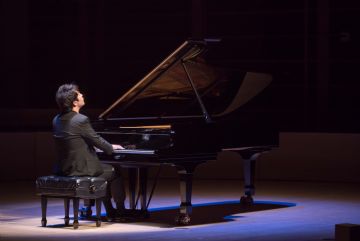|
Symphony
FROM THE NEW WORLD TO THE OLD WORLD
by Peter Lert
Saturday, June 14, 2025
Chamber
MC2 DUO RECITAL CLOSES 222'S SEASON
by Terry McNeill
Saturday, June 14, 2025
Choral and Vocal
CANTIAMO SONOMA'S LUSCIOUS A CAPELLA SINGING IN SEASON ENDING CONCERT
by Pamela Hicks Gailey
Sunday, June 8, 2025
Symphony
SRS SEASON ENDS WITH RESOUNDING TA-TA-TA-BANG
by Terry McNeill
Sunday, June 1, 2025
Symphony
YOUTHFUL VIRTUOSITY ON DISPLAY AT USO'S MAY CONCERTS
by Peter Lert
Saturday, May 17, 2025
Symphony
MYSTICAL PLANETS AND LIVELY GERSHWIN ORTIZ AT FINAL SRS CONCERT
by Peter Lert
Sunday, May 4, 2025
Symphony
VSO'S CONCERT MUSIC OF TIME, MUSIC OF PLACE
by Peter Lert
Sunday, April 27, 2025
VOCAL ELEGANCE AND FIRE AT THE 222'S RECITAL APRIL 26
by Pamela Hicks Gailey
Saturday, April 26, 2025
CANTIAMO SONOMA SINGS AN INSPIRED GOOD FRIDAY MOZART REQUIEM CONCERT
by Pamela Hicks Gailey
Friday, April 18, 2025
DRAMATIC SHOSTAKOVICH SYMPHONY CLOSES PHILHARMONIC'S 25TH SEASON
by Terry McNeill
Sunday, April 13, 2025
|
 |
 Lang Lang Playing Bach 10-3-15 in Weill Hall (Drew Altizer Photo) |
LANG LANG LAUNCHES WEILL HALL SEASON WITH EXPLOSIVE MUSICAL TRILOGY
by Terry McNeill
Saturday, October 3, 2015
Lang Lang has performed three times in Sonoma County, all reviewed at Classical Sonoma, and I was anxious when he mounted the Weill Hall stage Oct. 3 to hear what might have changed in his playing since September of 2013.
The program was exactly the same as played in recent Paris and Torino recitals (on YouTube) so the unique nature of the readings was somewhat familiar. And as the New York Times critic Anthony Tommasini has written, at a Lang Lang concert one hopes for the best.
Much of the best playing came with Tchaikovsky’s 1875 work The Seasons, Op. 37b. The work is more effective with a selection from the set of 12, and in some printed editions and performances the poems that precede each month are written or spoken in Russian. Mr. Lang didn’t opt for this construct (how is his Russian?) but no matter as he put his stamp on each, delighting in the contrasting poetic and stormy episodes. The pianist was achingly languorous in the “June” Barcarolle and Autumn Song “October,” and in “September’s” Hunting Song the volley of octaves in both hands were delivered with telling accuracy. The tempo for “October” was the slowest in memory and created a magical spell.
People always gravitate to Mr. Lang’s pyro techniques, but as in past recitals I find more interest when he uses melting phrases and a captivating pianissimo touch. This is a facet of his art that is mature and will last. In the concluding Christmas-Noël the Tempo di Valse had the appropriate winter enchantment but suffered from a long tasteless accelerando at the end. It’s a quiet ending, rare for a Tchaikowsky piano work, and the applause from the full 1,400 attendees in Weill was loud but not an ovation.
Bach’s popular Italian Concerto (S. 971) closed the first half and the pianist’s opening Allegro was brisk and arresting. New in his playing are abbreviated inner voices. These are not harmonic or stylistic voices that flesh out themes (such as heard in Hofmann and Cherkassky recordings) but piquant peppery accents that sometimes added charm to the music, and sometimes didn’t.
Embellishments were often unique but persuasive in the leisurely Andante and Bach’s swift contrapuntal lines were clear in the concluding Presto. The turn at the end was arpeggiated.
Following an extra-long intermission the artist tackled Chopin’s four Scherzos. Ops. 20, 32, 39 and 54. In past Weill appearances the pianist has played extended sets of Mozart Sonatas and Chopin Ballades, and here the restless and histrionic demands of the great Pole’s music drew aggressive and vehement interpretations. In the first B Minor Scherzo the lyric section was lovingly phrased and the difficult fiery coda powerful and convincing. A standing ovation followed the crashing final chords.
In the B-Flat Minor the performance reminded one of Artur Rubinstein, who played the Scherzo his entire career to close recitals. It had the requisite heroics but not enough of the work’s charm. My gold standard for the second Scherzo is the matinee handsome Pole Witold Malcuzynski, who played it in Berkeley on his farewell American tour with half Mr. Lang’s virtuosity, but with subtle pedaling and chaste majesty. There was brilliant finger technique and sledgehammer force here but strangely many scales, especially descending, were blurred. Yes, it’s hard to play really fast with clean note-to-note symmetry.
There was a standing ovation.
Mr. Lang’s strong fingers mastered the dramatic opening octaves of the C-Sharp Minor Scherzo, as he did beautifully in the chorale theme of leggierissimo arpeggios. This was a raucous spectacle of controlled pianistic fury and another standing ovation ensued, with the additional raw sound of hundreds of seat bottoms snapping to vertical as people jumped up.
A joyous change was the final E Major Scherzo, and Mr. Lang built short climaxes and elected a waltz character that emphasized sunny textures. By again speeding up the beginning of a coda the pianist missed conveying the enchanting phrase where the original rhythm returns. It seems he can’t avoid tinkering with endings that generate gallery-thrilling effects.
A standing ovation greeted Mr. Lang, who acknowledged in all directions from the stage his pleasure in such a triumph, but he didn’t return to the spotlight for a conventional set of encores. He first spoke about his Foundation 101 Pianist program for youth that would be on the same stage the next day, and then spoke of an imminent first trip to Cuba. For that he played a jazzy short Lecuona-like dance piece, as insipid as it was exciting.
|

